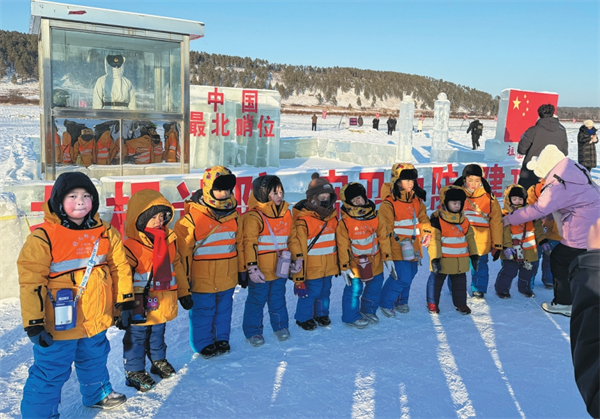Home>Sights
Charms of historic, multicultural city
Updated : 2014-03-18
By ( chinadaily.com.cn )
Harbin's long history and splendid culture date back at least to the Palaeolithic era and cave site at Jiaojie town where there was primitive human activity 175,000 years ago. In Yanjiagang, old campsites indicate that Harbin's ancestors labored and lived there 22,000 years ago.
Harbin is also the cradle of the Jin and Qing Dynasties.
The Jin Dynasty (1115-1234) established its capital in the city, today known as Acheng district, a name from the Manchu language that means honor.
It is also a city with a strong exotic flavor from the combined cultures of northern ethnic groups. It fused the Eastern and Western culture and is the only city in China where Buddhism, Taoism, Catholicism, Islam and Orthodox Christianity coexist.
It has established friendships with 31 cities in 26 countries and regions.
Known as "ice city and summer capital", Harbin has four distinct seasons and ranks second in the nation's top tourism cities.
It has 58 A-level tourism scenic spots, 13 S-level ski resorts, 86 star hotels and 307 travel agencies.
It is an international tourist city with beautiful scenery and distinctive European style.
In particular, the charm of its ice and snow tourism attracts numerous foreign guests.
Yabuli Ski Resort has become a well-known ski resort.
Yet Harbin is also a cool and pleasant summer resort.
Events include the Harbin Economic and Trade Fair and the Harbin Summer Music Concert.
Its attractions include Guogeli Street with its European architectural style, the Jinshangjing Museum of History and the former residence of Xiao Hong
Manchurian Tiger Park, Northern Forest Zoo and the Bamutong forest train are good choices for the eco-tourism.
Other scenic spots include the Double Dragon Mountain and Changling Lake. West of the lake, fishing areas are popular summer vacation resorts.
The hunting ground of Songfeng Mountain Yuquan and Yabuli Windmill Hill are also places for summer tourism.
The government and Party committee of Harbin decided in 2012 to build a brand called "Charming Harbin Summer" featuring wide participation of citizens, international exchanges and a leisure lifestyle.
The campaign includes the Sino-Russian Year of Tourism, the Wetland Festival, Harbin Summer International Beer Festival and Harbin International Economic and Trade Fair.
The programs are expected to upgrade urban management, increase the city's competitiveness and promote its fame.
But most importantly, it is making the city better understood by the world, according to the local government.
The second Harbin Songhua River Wetland Tourism Festival was held from June 10 to 24 in 2012. The event covered 12 wetland areas including Jinhewan Wetland Park, Yangmingtan Wetland Park, Songhua River Forest Park and Volga Manor.
Authorities planned 10 sightseeing routes on the land and 15 on the water.
More than 50 pleasure boats at 13 wetland harbors were put into service, as well as improved land transportation network with more bus lines and standardized signs.
The festival includes many activities such as a wetland wedding ceremony, sightseeing tours on the Songhua River, calligraphy and photography.
The 15-day festival attracted 1.16 million visitors, a 20 percent increase from the year previous.

Harbin ramps up childcare services
A new comprehensive service center for childcare in Harbin is expected to be finished by the end of the year.
-
Talent policies drive enterprise development in Harbin
Harbin's "30 New Talent Policies" represents an iterative upgrade to the talent policy system, helping attract and retain talent to bolster economic and social development.
-
Official website of 2025 Asian Winter Games goes live
Harbin, the host city of the 9th Asian Winter Games, has announced that the official website for the 2025 event has recently gone live.
-
Harbin launches measures to facilitate more foreign trade
In the first three quarters of 2023, the total import and export value of Heilongjiang province's goods trade hit 218.22 billion yuan.





